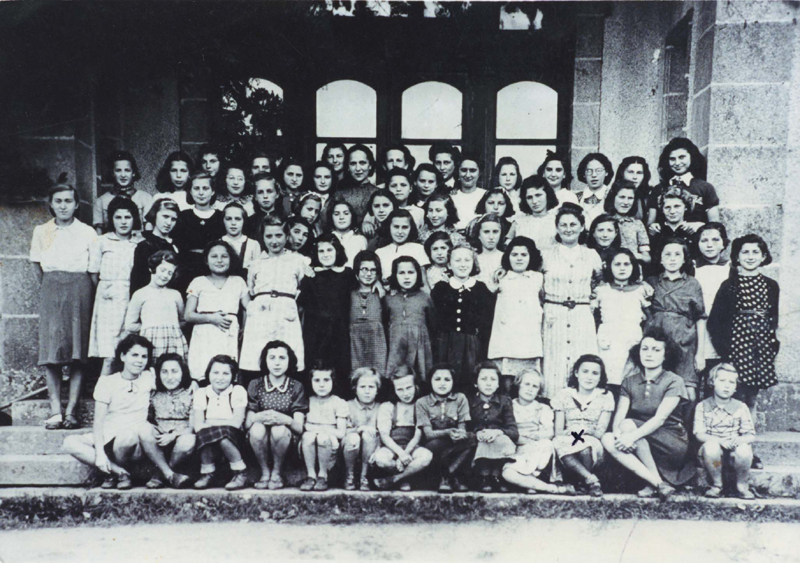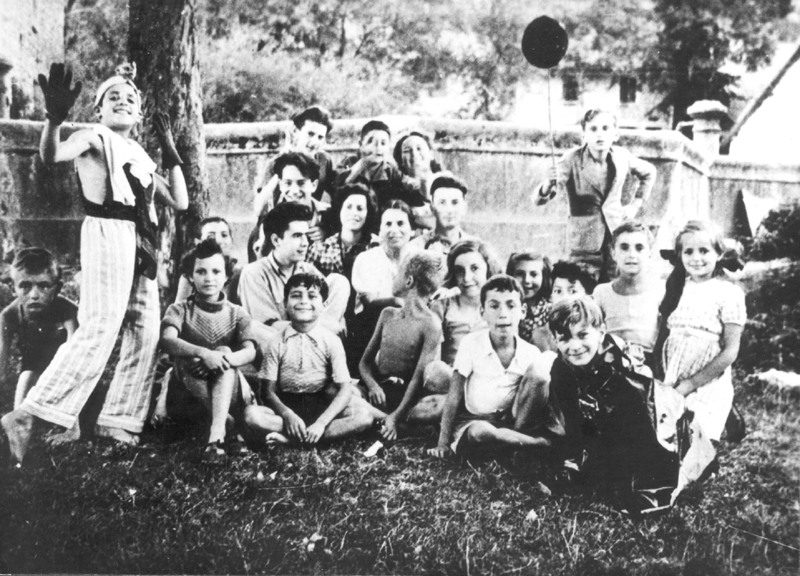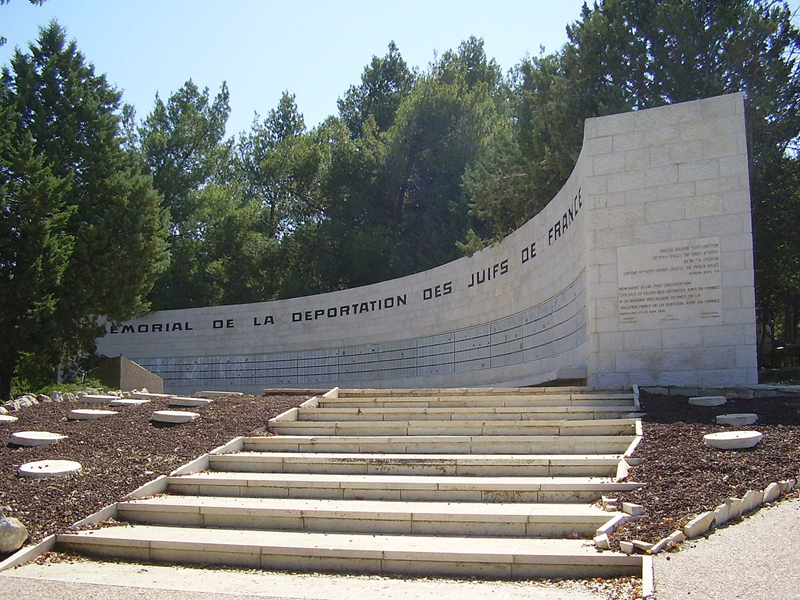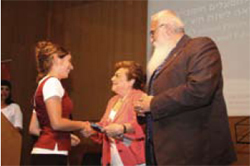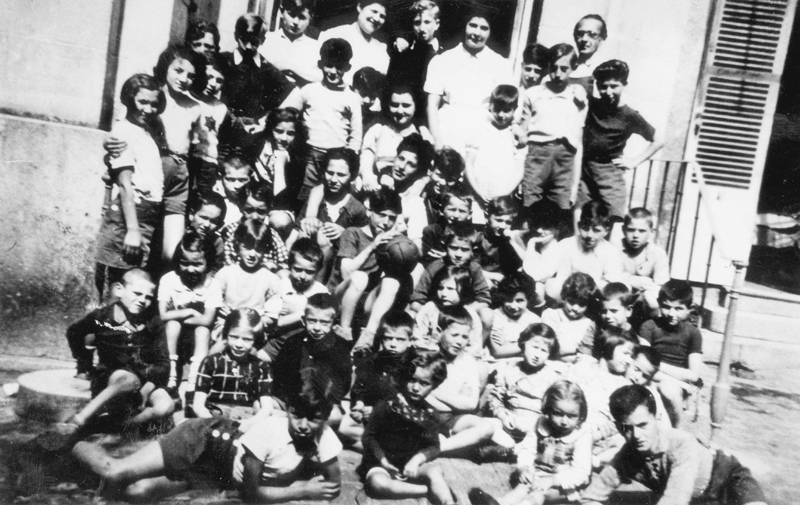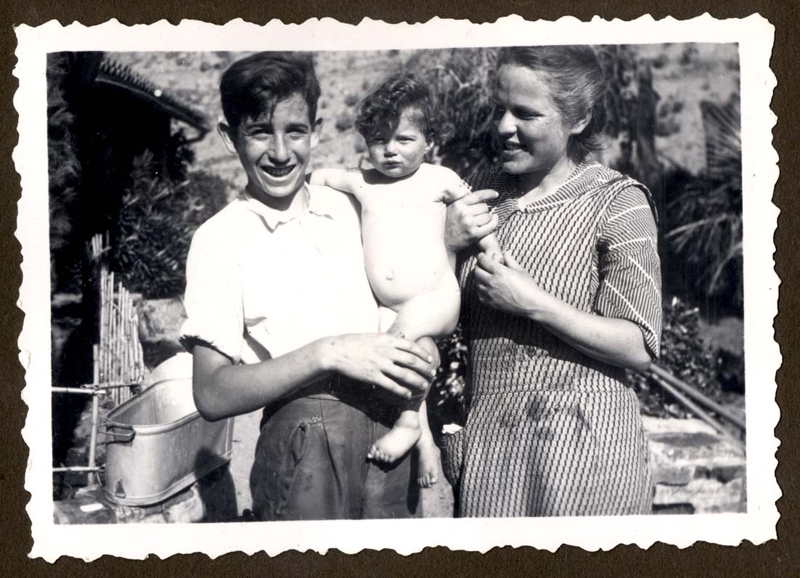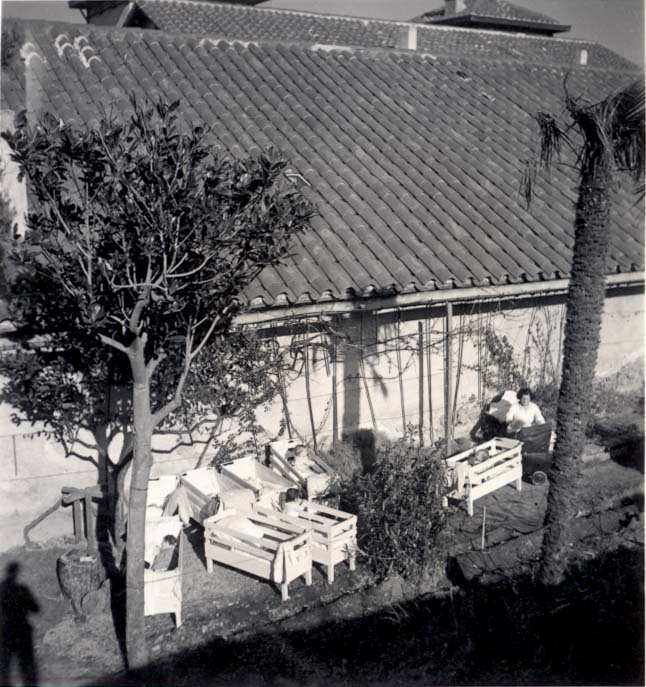Alumim is an Israeli association of Jewish children who were hidden in France during the Holocaust. The association was established in 1993 with the goal of preserving the memory of the Holocaust of French Jewry. It collects testimonies from survivors, presents testimonies in schools and to IDF soldiers, and holds various ceremonies. Alumim also encourages the [Israeli] education system to address the history of the Jews of France during the Holocaust. This project is coordinated by Ms. Dora Weinberger. We met with Ms. Weinberger and with Mr. Shlomo Balsam, the chair of the association, in order to learn more about the important activities of this organization.
Could you tell us a little about yourselves?
Dora: My name is Dora Weinberger, née Weissman. I was born in Germany in 1931, and after Hitler came to power in 1933 my parents moved to France. During the war, we lived in France, and in 1948 I made Aliyah. After arriving in Israel, I got married, started a family, studied at Bar-Ilan University, and worked for almost 30 years as a French teacher and educator.
Shlomo: My name is Shlomo Balsam. I was born in 1948 in Paris and am a second-generation Holocaust survivor. Around 40 members of my family perished in the Holocaust. I made Aliyah in 1968 and returned to France a few years later to serve at the Israeli embassy in Paris. I have been active in education all my life – I worked as a teacher and educator, as a coordinator of informal education, and in Israel I directed the Jewish Agency’s Hizkiyahu Institute, which trains teachers and youth leaders. Today I guide visits to Poland. For many years I served as the educational director of the FSU Desk and was responsible for education in Eastern Europe on behalf of the Jewish Agency, which was how I first came to visit Poland. Today I lead groups visiting Poland and am serving as chair of Alumim for my sixth year.
How was the organization established and what is its objective?
The organization was established in 1993 following a conference called “The Hidden Children,” which focused on the issue of hidden children in all of the different countries. It was decided to establish an Israeli association of children who were hidden in France. The founder of the organization, Rebbetzin Rivka Avichail, served as the first chair, and she chose the organization’s name with the help of her husband, Rabbi Eliahu Avichail. The first goal of Alumim was to create a framework to enable the members to share and document their experiences through lectures, discussion groups, speaker programs, and other activities. The main motivation was the feeling after the war that Holocaust survivors from France were not really considered survivors. There were the heroes who fought in the ghettoes and forests, there with the survivors from the camps – the survivors from Auschwitz had numbers tattooed on them – but in the case of France, there was nothing. They had “just” been moved from place to place like parcels. In 1991, when the survivors were already adults with families, they decided to begin to talk about themselves and what happened to them during the Holocaust.
We are a member of the Center Organizations of Holocaust Survivors, which serves as an umbrella body for 52 organizations representing the communities that suffered from Nazi persecution during the Second World War. We recently celebrated 20 years of activities in Alumim, and the organization is continuing to grow and expand. Every year dozens of new members join us, and we now have over 700 members and publish a newspaper with a circulation of 1,200.
Is there any particular criterion for the age of the hidden children who become members of the organization?
Shlomo: Definitely. According to the rule established by Alumim, a member of the organization must be someone born after 1 January 1924 and not later than 31 December 1944 – in other words, children who were aged 20 or under when the war ended. We have around 700 members who pay a membership fee of NIS 150 a month, all of them survivors who were hidden as children during the Holocaust. We also have about 30 members registered as second-generation survivors. These members cannot receive financial aid, vote, or be elected, but they can be chosen – as I was – to serve as chair of the organization.
What are the organization’s main activities?
Shlomo: The organization is active in a variety of areas, one of which is organizing ceremonies and commemorations. Every year on Holocaust Day we hold a ceremony in Rogelim Forest, where a memorial has been erected to the memory of 800,000 French Jews who perished during the Holocaust. The members and their families come to the ceremony.
Dora: We try to include delegations from schools every year in the ceremony, and sometimes we also host Righteous Gentiles who hid the children. This is an important experience for the delegations, and we receive moving letters and reactions after each encounter. The children study the subject at school but encounter a completely different experience than in the textbooks. I feel the same way in my meetings with students at schools, when I tell them about my own story as a girl in France. Even children who are considered “tough cases,” and whose teachers warn me about them at the beginning of each session, listen attentively and are very moved. I think the reason for this is that it is the first time that these children have met someone in person who experienced the Holocaust – a first-person testimony rather than information in an encyclopedia or book.
As part of my work, I also initiated meetings between students and Holocaust survivors in the survivors’ homes. The students interview the survivors and then write fascinating historical projects based on the testimonies. In addition to the historical information, they also include a description of the experience of meeting the survivor. I should add that the members of the organization are very willing to take part in this great project.
Does the organization also have members who were not born in France?
Shlomo: Of course. We have members who were born in North Africa or in other European countries, but who experienced the Holocaust in France. The decision to include North Africa in the preparation of the historical projects created a lot of interest among the students.
Can you tell us about the educational cooperation between Alumim and Yad Vashem?
Shlomo: In 2000, when Dr. Yisrael Lichtenstein was serving as chair of the association, we began to operate the Yad Vashem Prizes project, which Dora is responsible for, as part of the research project on the Holocaust of French Jewry.
Dora: I was invited to France, where we established the research project to commemorate the Holocaust of the French Jews. The project is funded by the Fund for the Memory of the Holocaust in France and has been active for 15 years in cooperation with Yad Vashem.
Shlomo: As part of the project, many of the members of Alumim give testimonies in schools. The testimonies are later included in the students’ research and documentation projects. This is really sacred work. Another activity the organization is involved in is providing medical and social assistance to members who are facing difficult medical or financial circumstances. We help them with dental and eye treatments and so forth. The help isn’t always financial -
sometimes it is emotional; we also provide assistance over the phone once a week, in Tel Aviv and Jerusalem.
How do the members of the organization receive the assistance?
Shlomo: The social assistance is provided in a very discrete and orderly manner, through two social workers working on our behalf. Assistance is provided on the basis of several criteria. We have around 50 members receiving assistance from Amcha (the Israeli Center for Mental Health and Social Support for Holocaust Survivors and the Second Generation) – we fund their therapy.
So around one-tenth of the association’s members seek psychological support through you?
Shlomo: Absolutely, and about one-third of the members also receive social assistance. We basically cover everything that the state does not provide – both in the medical sphere and in terms of helping them cope with various bureaucratic procedures. Another issue the association deals with, and which I have been personally involved in, is receiving compensation. In the early 2000s, France passed a law providing financial compensation to the survivors (in addition to the reparations, which involve a difficult bureaucratic process, for which we also provide assistance). Survivors can receive compensation for expropriation or a pension as an orphan if one of their parents was deported from France and perished (whether or not they were French citizens). Helping with compensations wasn’t one of the goals of the association when it was established, but it meets a need that has emerged over the years.
Can you briefly describe what happens at the meetings of Alumim members?
Shlomo: The meetings and discussion groups are closed to the members only. After I was appointed chair, I asked for permission to participate in one of the sessions. I can tell you that I was absolutely amazed by the level of discussion and the openness. For example, one member suggested that they discuss the first time they saw their parents. Two members began to talk about this and they just burst out in tears, and then they felt that it had helped them because they had felt a need to talk about it. Another time the conversation focused on the fear of death during the war and during the wars in Israel (some of the hidden children fought in the War of Independence). One of the members brought his son along, an officer in the Duvdevan unit, and they tried to compare the fear then with the fear today. It was a totally amazing experience.
Are the encounters only for the survivors themselves, or do psychologists and other professionals sometimes participate?
Shlomo: In Tel Aviv, they chose to hold the meetings with a professional, the psychologist Yisrael Feldman, who is actually a victimologist. But in Jerusalem, they chose to meet without a professional present.
These sessions are held about once a month.
Dora: I have personally met members of Alumim at the social activities in Jerusalem and Tel Aviv who have really become part of my family.
In light of your extensive work with the association and your own life experiences, Dora, could you try to explain the impact that living as a hidden child has on someone?
Dora: When Rebbetzin Rivka Avichail, who was a French teacher, began to look for hidden children in order to establish the organization, we didn’t even understand what a hidden child was, even though we were all hidden children ourselves. Over the years we just hadn’t talked about this subject, because compared to the horrors experienced by the Jews in Eastern Europe, we felt that we didn’t have anything to “offer” in terms of our story. We couldn’t talk about our parents’ experiences in the Holocaust, and actually most of us were happy during the Holocaust. I think that the sentence that sums us up best is: “They played during the day and cried at night.” Thanks to Rivka, we established a small group of members and went from person to person, trying to document their experiences. I was responsible for getting them to open up to me.
How did you document the stories?
Dora: I made recordings with a tape recorder and then later I sat down and typed it up. The results were sent to the Fondation de la Shoah Mémoire in Paris and to Yad Vashem. It wasn’t easy to get the survivors to talk. At first, they only gave me technical information – “we were hidden in such-and-such a place,” and they insisted that apart from that “nothing happened.” They didn’t understand the damage they had suffered due to being hidden – damage that remained for many years to come. Today things are different – people call me of their own accord through our hotline. My task is to listen to their stories, and in order to do that I need a lot of mental strength. Of course, I also have my own personal story that I take with me.
Their amazing stories make think about how, as children in hiding, we managed to maintain our sanity, more or less. For example, I think about Moshe Roth’s book (“Rooster Boy”). He was hidden on a farm and had no-one to talk to. His best friend was a rooster who he played and talked with.
Shlomo: There’s also Miriam Tropper from Sde Eliahu, who was hidden together with her sister for a year under a pigsty. They would only come out at night to breathe fresh air.
Dora: It’s important to understand that taking care of a little four-year-old girl when you yourself are only 10, as I was with my sister, is also considered being alone.
This area formed the basis for another activity of the organization, providing information to people who were hidden during the Holocaust in France. People who don’t have the information turn to us and ask for help. For example, one survivor told me that when she was two, she was thrown out of a train heading for Auschwitz. Before she was thrown out, they put a note with her first name and family name, but without her parents’ name. A farmer picked her up and saved her life, and at the end of the war he handed her over to the Jewish orphanages in France. I spent a month researching this case, with the help of the historian Serge Klarsfeld, who in 1990 opened up the records of the French and discovered some important details about her. At the end of the process, I was able to give her three important details: her real date of birth, who her parents were, and a third detail that was particularly painful: that she wasn’t alone on the train. She had two brothers who died along with her parents.
Shlomo: That same woman was in an orphanage after the war. Since no-one came to ask for her, she was placed in a Youth Aliyah group and came to Israel at the age of five or six. On the kibbutz, she was given a Hebrew first name, and this is the identity she’s known all her life. When she asked me the question, I asked her – why now, when she was nearly 80, was she suddenly taking an interest in her identity? Her answer was that her grandson was doing a project on his family roots and she didn’t know how to help him. So in this way, through the second and third generations, the survivors are starting to find out details about themselves.
I myself only began to get involved in the subject of the Holocaust when I was nearly 50, and that’s when I investigated my own roots properly. Now is really the last minute for the Holocaust survivors to document and explore their histories, with the help of sources and the many studies that have already been undertaken. In the members’ discussion groups, they also find out new things all the time.
Is the organization also involved in the subject of the Righteous Gentiles in France?
Shlomo: Absolutely. Alumim has done a lot over the years to recognize the rescuers who hid our members as Righteous Gentiles. Every year on Holocaust Day, a delegation of grandchildren and great-grandchildren of the Righteous Gentiles come to Israel as the guests of the France-Israel Friendship Association, and they meet with survivors and their families. This is part of an initiative by Sarah, a Jewish woman from France, together with Berta, a member of Alumim.
What do you think was special about the fate of the children hidden in France?
Dora: The Holocaust in France was different than the Holocaust in Eastern Europe, and this is something I’ve seen over my ten years working in the Righteous Gentile Committee. Firstly, there were no ghettoes in France. Secondly, in France they took the men first, while the women and children were left on their own. Sometimes the women left the cities and went to seek shelter in the villages. Thirdly, rescue networks were established, such as the Jewish organization OSE, which took children out of the detention camps such as Pithiviers and Beaune-la-Rolande and concealed them in hiding places and refuges – farmhouses, monasteries, and other institutions.
Shlomo: Right. In the East, where the Jews underwent terrible atrocities, some children were also saved, but in France the rescue operation had some unique aspects. A total of 10,000 children were hidden and rescued in France by Jewish underground organizations, by smuggling them to Switzerland (Andrea Salomon was particularly active in this case) or Spain, or by finding them different places to hide. 50,000 children were hidden by local residents. A total of 11,400 Jewish children perished in France, so relative to the population this was a minority (there were 300,000 in France, including around 70,000 children). This is a unique phenomenon!
Can you tell us about your website?
Dora: We have a website in Hebrew and French that attracts quite a lot of visitors. I started to create it, and it now has a lot of material. Unfortunately, we don’t have enough people who are willing to work on a voluntary basis. When we get money to employ someone, we find it hard to find someone who knows Hebrew and French who is an expert in the subject.
Shlomo: Of course, we also have our journal in Hebrew and French, which is funded by the membership fees. The editor is the journalist Michael Blum, who isn’t a member of the organization, but his family is. The journal is arranged by themes and is mainly used to provide additional study materials for schools. The goal is to upload this material to the website, too.
Dora: Our spokesperson, Rivka Avichail, initiated the founding of the journal. The first issues were limited in scope and appeared in French because our Hebrew wasn’t good enough. At present, because of finances, the journal is only issued three times a year. Over recent years, the members have been strict about writing for the journal in Hebrew without any linguistic editing, even though some of them still don’t have particularly good Hebrew. The journal today includes a large quantity of didactic and pedagogic material, and the fact that it’s written in Hebrew makes it accessible to school students who receive it from us. The students can use the journals to help them write their projects.
As a final question, do you think that the association has a vision for its future, particularly given the members’ age?
Shlomo: It’s true that most of the activities in the organization are undertaken by the first generation, with a few people from the second generation, like myself. I’m not sure right now whether they will continue with it. For example, the underground organization that was closed was reopened by the second generation, but it only lasted for a year. The number of organizations in the Center of Organizations is falling as the years pass. On the other hand, some organizations are not declining, such as the Organization of Israelis of Central European Origin. It’s true that not many people from the second generation come to Alumim’s activities, with the exception of the ceremony in Rogalit, but we are constantly trying to involve them. So far it hasn’t worked too well, but we continue to hope.





